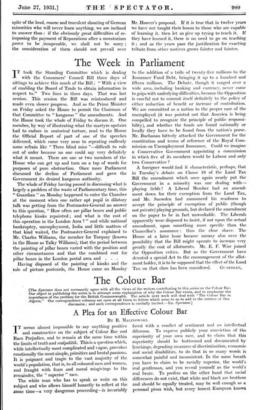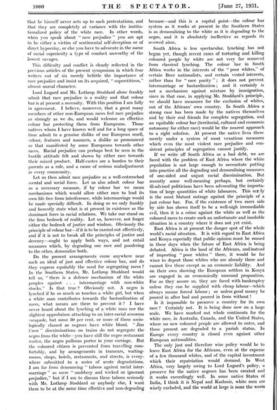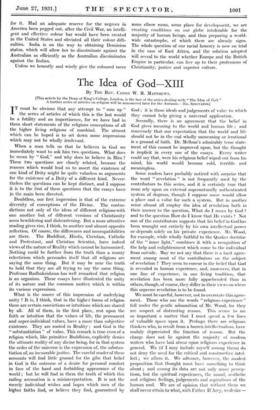The Colour Bar
[The Spectator does not necessarily agree with all the views of the writers contributing to this series on the Colour Bar. Our object in publighing the series is to attempt some explanation of why the Colour Bar exists, and to emphasize the importance of the problem for the British Commonwealth. The article next week will deal with "The Colour Bar in Algeria." Our correspondence columns are open at all times to letters which seem to us to add to the interest of this discussion ; and such correspondence is cordially invited.—ED. Spectator.] A Plea for an Effective Colour Bar By B. MALINOWSKI.
IT seems almost impossible to say anything positive and constructive on the subject of Colour Bar and Race Prejudice, and to remain at the same time within the limits of truth and realpolitik. This is a question which, while intellectually most complicated and vague, provokes emotionally the most simple, primitive and brutal passions. It is poignant , and tragic to the vast majority of the world's population, that is, to all coloured men and women, and fraught with fears and moral misgivings to the remainder, the " superior " race.
The white man who has to speak or write on this subject and who allows himself honestly to reflect at the Same time—a very dangerous proceeding—is invariably faced with a conflict of sentiment and an intellectual dilemma. To express publicly your conviction of the superiority of your own race, and to claim that this superiority should be buttressed and documented by lynchings, degrading measures of discrimination, economic and social disabilities, to do that in so many words is somewhat painful and inconsistent. In the same breath you have to claim to be racially superior, the world's real gentleman, and you reveal yourself as the world's real brute. To profess on the other hand that racial differences do not exist, that white and black are brothers and should be equally treated, may be well enough as a personal pious wish, but every honest European knows that he himself never acts up to such protestations, and that they are completely at variance with the institu- tionalized policy of the white race. In other words, when you speak about " race prejudice " you are apt to be either a victim of sentimental self-deception or of direct hypocrisy, or else you have to advocate in the name of racial superiority a type of conduct unworthy of the lowest savages.
This difficulty and conflict is clearly reflected in the previous articles of the present symposium in which four writers out of six merely belittle the importance of race prejudice and insist on its acquired, " superstitious," almost unreal character.
Lord Lugard and Mr. Lothrop Stoddard alone frankly admit that race prejudice is a reality and that colour bar is at present a necessity. With this position I am fully in agreement. I believe, moreover, that a great many members of other non-European races feel race prejudice as strongly as we do, and would welcome an effective colour bar protecting them from .Europeans. Those natives whom I have known well and for a long space of time admit to a genuine dislike of our European smell, colour, features and manners, a dislike as pronounced as that manifested by some Europeans towards other races. Racial prejudice can perhaps best be seen in the hostile attitude felt and shown by either race towards their mixed product. Half-castes are a burden to their parents as a rule, and a cause of serious maladjustment in every community.
Let us then admit race prejudice as a well-entrenched mental and social force. Let us also admit colour bar as a necessary measure, if by colour bar we mean mechanisms which would allow, either race to lead its own life free from interference, while intermarriage would be made specially difficult. In doing so we only frankly and honestly state what is at present in existence as the dominant force in racial relations. We take our stand on the firm bedrock of reality. Let us, however, not forget either the bedrock of justice and wisdom. Obviously the principle of colour bar—if it is to be carried out effectively, and if it is not to break all the principles of justice and decency—ought to apply both ways, and not entail measures which, by degrading one race and pandering to the other, demoralize both.
Do the present arrangements come anywhere near such an ideal of just and effective colour bar, and do they express equitably the need for segregating races ? In the Southern States, Mr. Lothrop Stoddard would tell us, " there is a defence mechanism of the white peoples against . . . intermarriage with non-white stocks." Is that true ? Obviously not. A negro is lynched if he so much as touches a white girl, but when a white man contributes towards the bastardization of races, what means are there to prevent it ? I have never heard about the lynching of a white man nor the slightest opprobrium attaching to an inter-racial amorous escapade, but some 30 per cent. or more of those socio- logically classed as negroes have white blood. " Jim Crow " discriminations on trains do not segregate the negro from the white—you have still the negro restaurant waiter, the negro pullman porter in your carriage. But the coloured citizen is prevented from travelling com- fortably, and by arrangements in tramcars, waiting- rooms, shops, hotels, restaurants, and streets, is every- where submitted to a series of acute degradations. I am far from denouncing " taboos against racial inter- marriage " as mere " snobbery and wicked or ignorant prejudice," but if I am to discuss these taboos seriously with Mr. Lothrop Stoddard or anybody else, I want them to be at the same time effective and non-degrading because—and this is a capital point—the colour bar system as it works at present in the Southern States is as demoralizing to the white as it is degrading to the negro, and it is absolutely ineffective as regards its avowed aims.
South Africa is less spectacular, lynching has not begun yet, though recent cases of torturing and killing coloured people by white are not very far removed from classical lynching. The colour bar in South Africa works in the interests of the " poor whites," of certain Boer nationalists, and certain vested interests, rather than for " race purity " ; it does not prevent intermarriage or bastardization ; and it certainly is not a mechanism against mixture by immigration, since in that case, in applying Mr. Stoddard's principle, we should have measures for the exclusion of whites, out of the Africans' own country. In South Africa a strong case has been made by the natives themselves and by their real friends for complete segregation, and an equitable colour bar (territorial, cultural and economic autonomy for either race) would be the nearest approach to a right solution. At present the native lives there merely under a system of most vexatious measures which even the- most violent race prejudice and con- sistent principles of segregation cannot justify.
If we write off South Africa as a bad debt, we are faced with the problem of 'East Africa where the white population is not large enough to necessitate putting into practice all the degrading and demoralizing measures of one-sided and unjust racial discrimination. But recently some well-meaning perhaps, but certainly ill-advised politicians have been advocating the importa- tion of large quantities of white labourers. This sur2ly is the most blatant outrage against the principle of a just colour bar. For, if the existence of two races side by side has shown itself to be a well-nigh irremediable evil, then it is a crime against the white as well as the coloured races to create such an unfortunate and insoluble situation in a country where it does not yet exist.
East Africa is at present the danger spot of the whole world's racial situation. It is with regard to East Africa and Kenya especially that public opinion must be roused in these days when the future of East Africa is being debated. Africa is the land of the Africans, and instead of importing " poor whites " there, it would be far wiser to deport those whites who are already there and cannot live there except as an economic liability. And on their own showing the European settlers in Kenya are engaged in an economically unsound proposition. For as they assure us, they are faced with bankruptcy unless they can be supplied with cheap labour—Which always means forced labour ; or unless good money be poured in after bad and poured in from without !
Is it impossible to preserve a country for its own race ? Certainly not. It is being done now on a large scale. We have marked out whole continents for the white race, in Australia, Canada, and the United States, where no new coloured people are allowed to enter, and those present are degraded to a pariah status. In Europe every country is closed even against other European nationalities.
The only just and therefore wise policy would be to leave East Africa for the Africans, even at the expense of a few thousand whites, and of the capital investment which their repatriation would demand. In West Africa, very largely owing to Lord Lugard's policy, a preserve for the native negroes has been created and it works exceedingly well. In some native States of India, I think it is Nepal and Kashmir, white men are wisely excluded, and the world at large is none the wor's'e for it. 'Had an adequate reserve for the' negroes in America been pegged out, after the Civil War, an intelli- gent and effective colour bar would have been created in the United States and obviated all their colour diffi- culties. India is on the way to obtaining Dominion status, which will allow her to discriminate against the Australian as efficiently as the Australian discriminates against the Indian.
Unless we honestly and wisely give the coloured races some elbow room, some place for development, we are creating conditions on our globe intolerable for the majority of human beings, and thus preparing a world- wide catastrophe, of which there are already signs. The whole question of our racial honesty is now on trial in the case of East Africa, and the solution adopted will reveal to the world whether Europe and the British Empire in particular, can live up to their professions of Christianity, justice and superior culture.








































 Previous page
Previous page